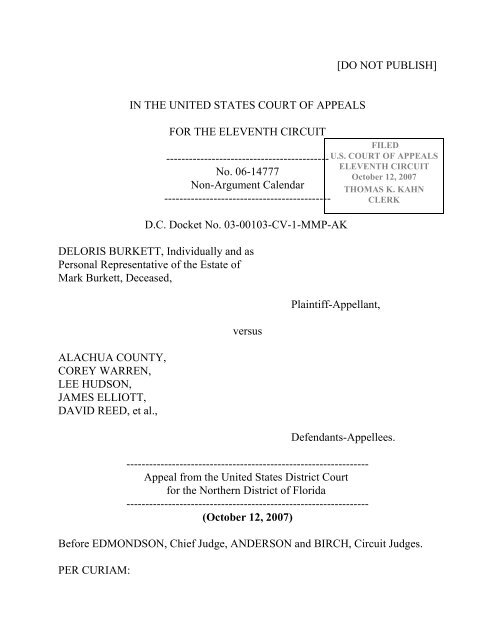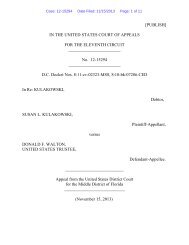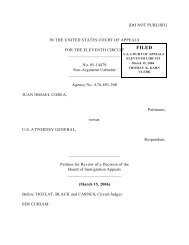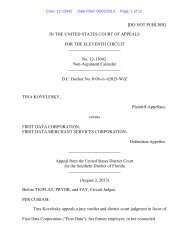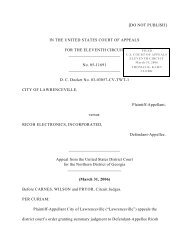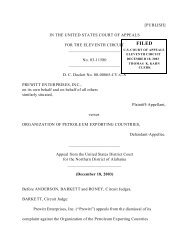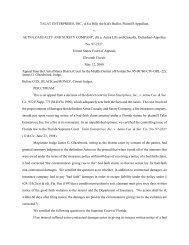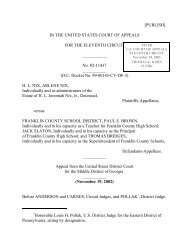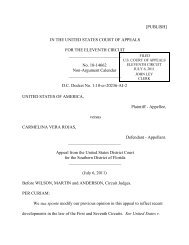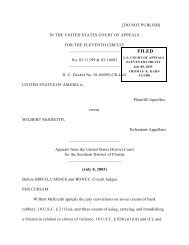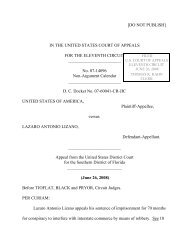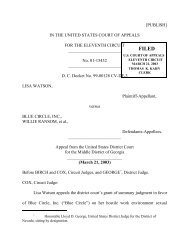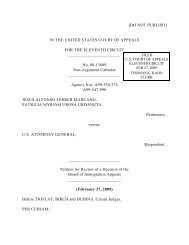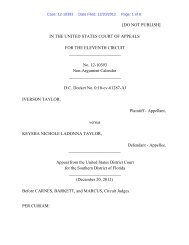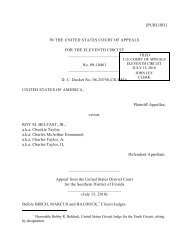Burkett v. Alachua County - Court of Appeals - 11th Circuit
Burkett v. Alachua County - Court of Appeals - 11th Circuit
Burkett v. Alachua County - Court of Appeals - 11th Circuit
Create successful ePaper yourself
Turn your PDF publications into a flip-book with our unique Google optimized e-Paper software.
IN THE UNITED STATES COURT OF APPEALS<br />
FOR THE ELEVENTH CIRCUIT<br />
-------------------------------------------<br />
No. 06-14777<br />
Non-Argument Calendar<br />
--------------------------------------------<br />
D.C. Docket No. 03-00103-CV-1-MMP-AK<br />
DELORIS BURKETT, Individually and as<br />
Personal Representative <strong>of</strong> the Estate <strong>of</strong><br />
Mark <strong>Burkett</strong>, Deceased,<br />
ALACHUA COUNTY,<br />
COREY WARREN,<br />
LEE HUDSON,<br />
JAMES ELLIOTT,<br />
DAVID REED, et al.,<br />
versus<br />
[DO NOT PUBLISH]<br />
FILED<br />
U.S. COURT OF APPEALS<br />
ELEVENTH CIRCUIT<br />
October 12, 2007<br />
Plaintiff-Appellant,<br />
THOMAS K. KAHN<br />
CLERK<br />
Defendants-Appellees.<br />
----------------------------------------------------------------<br />
Appeal from the United States District <strong>Court</strong><br />
for the Northern District <strong>of</strong> Florida<br />
----------------------------------------------------------------<br />
(October 12, 2007)<br />
Before EDMONDSON, Chief Judge, ANDERSON and BIRCH, <strong>Circuit</strong> Judges.<br />
PER CURIAM:
Plaintiff-Appellant Deloris <strong>Burkett</strong> (“Plaintiff”), appearing individually and<br />
as representative <strong>of</strong> the estate <strong>of</strong> her deceased son, Mark <strong>Burkett</strong> (“<strong>Burkett</strong>”),<br />
appeals the grant <strong>of</strong> summary judgment to <strong>Alachua</strong> <strong>County</strong>, Florida, the Sheriff <strong>of</strong><br />
<strong>Alachua</strong> <strong>County</strong> (the “Sheriff”), and <strong>Alachua</strong> <strong>County</strong> Jail correctional <strong>of</strong>ficers<br />
sued in their individual capacity (the “Correctional Officers”) on her 42 U.S.C. §<br />
1983 claim. No reversible error has been shown; we affirm.<br />
We review de novo the grant <strong>of</strong> summary judgment. Info. Sys. & Networks<br />
Corp. v. City <strong>of</strong> Atlanta, 281 F.3d 1220, 1224 (<strong>11th</strong> Cir. 2002). Summary<br />
judgment is proper when the evidence shows “that there is no genuine issue as to<br />
any material fact and that the moving party is entitled to a judgment as a matter <strong>of</strong><br />
law.” Fed.R.Civ.P. 56(c). We view the evidence in the light most favorable to the<br />
non-moving party. Beck v. Prupis, 162 F.3d 1090, 1096 (<strong>11th</strong> Cir. 1998).<br />
In the early morning hours <strong>of</strong> 13 June 2001, Gainesville Police Officers<br />
responded to a call from Plaintiff that her 18 year-old son was acting very<br />
1<br />
strangely. Plaintiff requested that <strong>of</strong>ficers take <strong>Burkett</strong> for a psychiatric<br />
evaluation. Although <strong>Burkett</strong>, who was 6’2’’ and weighed approximately 245<br />
pounds, initially did not resist <strong>of</strong>ficers’ attempt to place him into the police car,<br />
1<br />
According to Plaintiff’s complaint, <strong>Burkett</strong> “had exhibited unusual behavior throughout the day,<br />
including detachment, irrationality and other behaviors consistent with mental and emotional<br />
instabilities.”<br />
2
<strong>Burkett</strong> became agitated as he approached the police car. As <strong>Burkett</strong>’s father was<br />
helping <strong>Burkett</strong> to the car, <strong>Burkett</strong> grabbed his father’s shirt, cocked his head<br />
back, and “head-butted” his father. Officers struggled to place <strong>Burkett</strong> on the<br />
ground; and <strong>Burkett</strong> bit the hand <strong>of</strong> one <strong>of</strong> the <strong>of</strong>ficers. <strong>Burkett</strong> also kicked at<br />
other <strong>of</strong>ficers. Officers then took <strong>Burkett</strong> to the <strong>Alachua</strong> <strong>County</strong> Jail.<br />
<strong>Burkett</strong> was placed into a holding cell around 4 a.m.; and he banged on his<br />
cell door and shouted obscenities until around 8 a.m., when <strong>of</strong>ficers entered<br />
<strong>Burkett</strong>’s cell to take him to his first appearance before a judge. Officers ordered<br />
<strong>Burkett</strong> to lie down on the floor so that <strong>of</strong>ficers could handcuff him; but <strong>Burkett</strong><br />
was unresponsive to this command. An <strong>of</strong>ficer then shot <strong>Burkett</strong> with a taser gun<br />
and handcuffed him. At his first appearance, <strong>Burkett</strong> continued to act strangely;<br />
and the presiding judge ordered that <strong>Burkett</strong> receive a mental health evaluation.<br />
The judge also ordered that a blood sample be taken from <strong>Burkett</strong>. 2<br />
At approximately 12:00 p.m., <strong>Burkett</strong> received a shot to sedate him. At 3:00<br />
p.m., <strong>of</strong>ficers and a nurse entered <strong>Burkett</strong>’s cell to draw blood from him. <strong>Burkett</strong><br />
was still handcuffed and shackled at his legs. <strong>Burkett</strong> did not respond to an<br />
<strong>of</strong>ficer’s orders to lie down on the floor; so the <strong>of</strong>ficer grabbed <strong>Burkett</strong> by the arm.<br />
2<br />
Because <strong>Burkett</strong> had engaged in a physical struggle with the <strong>of</strong>ficers who picked him up from<br />
Plaintiff’s home, including biting one <strong>of</strong> them, the judge ordered that <strong>Burkett</strong> receive an HIV test.<br />
3
<strong>Burkett</strong> became agitated, moved towards the <strong>of</strong>ficers, and began kicking his legs.<br />
During this altercation, the vials carried by the nurse into <strong>Burkett</strong>’s cell were<br />
knocked to the ground. Several <strong>of</strong>ficers wrestled <strong>Burkett</strong> to the floor, where he<br />
was held face down. An <strong>of</strong>ficer held a folded-up blanket up to <strong>Burkett</strong>’s head.<br />
3<br />
<strong>Burkett</strong> continued to resist being restrained by the <strong>of</strong>ficers. An <strong>of</strong>ficer used a stun<br />
gun against <strong>Burkett</strong>; and another <strong>of</strong>ficer administered “knee strikes” to <strong>Burkett</strong>’s<br />
outer thigh. Officers then placed <strong>Burkett</strong> into a “three-point restraint,” which<br />
linked the restraints around his wrists and ankles behind his back. After <strong>of</strong>ficers<br />
placed <strong>Burkett</strong> in the three-point restraint, the blanket was removed from the side<br />
<strong>of</strong> <strong>Burkett</strong>’s head. <strong>Burkett</strong> stopped moving; and medical help arrived at <strong>Burkett</strong>’s<br />
cell. The medical personnel asked that <strong>Burkett</strong>’s restraints be removed, which<br />
took up to two minutes. <strong>Burkett</strong> had stopped breathing; and medical personnel<br />
conducted CPR. <strong>Burkett</strong> was transferred to a hospital, where he later was<br />
pronounced dead.<br />
4<br />
3<br />
One <strong>of</strong>ficer testified that the blanket was used to prevent <strong>Burkett</strong> from biting an <strong>of</strong>ficer.<br />
Although another <strong>of</strong>ficer in <strong>Burkett</strong>’s cell testified that he did not remember seeing a blanket used<br />
against <strong>Burkett</strong>, because we construe the facts in the light most favorable to Plaintiff, we will assume<br />
that a blanket was held up to <strong>Burkett</strong>’s head.<br />
4<br />
Experts disagreed about the cause <strong>of</strong> <strong>Burkett</strong>’s death. One expert concluded that <strong>Burkett</strong>’s death<br />
was the result <strong>of</strong> traumatic brain injury; and another expert determined that <strong>Burkett</strong> died as a result<br />
<strong>of</strong> “acute exhaustive mania,” which occurs in schizophrenic patients who experience “agitation,<br />
paranoid delusion and combative behavior followed by cardiovascular collapse and death when<br />
efforts are made to restrain them.” The latter expert noted that schizophrenia runs in <strong>Burkett</strong>’s<br />
family. We construe this conflicting evidence in the light most favorable to Plaintiff.<br />
4
Plaintiff asserts that the Correctional Officers violated the Fourth<br />
Amendment by using excessive force against <strong>Burkett</strong> in an attempt to receive a<br />
5<br />
blood sample from him. Plaintiff also argues that the Correctional Officers<br />
violated the Due Process Clause <strong>of</strong> the Fourteenth Amendment by acting with<br />
6<br />
deliberate indifference to <strong>Burkett</strong>’s mental health. About this claim, Plaintiff<br />
argues that the Correctional Officers ignored <strong>Burkett</strong>’s medical needs by applying<br />
a taser gun to him, injecting him with a sedative, and physically restraining him.<br />
In addition, Plaintiff contends that <strong>Alachua</strong> <strong>County</strong> and the Sheriff failed to train<br />
<strong>of</strong>ficers or to implement policies on how to handle mentally ill detainees and on<br />
5<br />
“Claims involving the mistreatment <strong>of</strong> arrestees or pretrial detainees in custody are governed by<br />
the Fourteenth Amendment’s Due Process Clause,” and require a showing <strong>of</strong> deliberate indifference<br />
to a substantial risk <strong>of</strong> serious harm. Cottrell v. Caldwell, 85 F.3d 1480, 1490 (<strong>11th</strong> Cir. 1996). But<br />
Plaintiff asserts protection under the Fourth Amendment, which is commonly an easier standard for<br />
a plaintiff to meet. “The precise point at which a seizure ends (for purposes <strong>of</strong> Fourth Amendment<br />
coverage) and at which pretrial detention begins (governed until a conviction by the Fourteenth<br />
Amendment) is not settled in this <strong>Circuit</strong>.” Hicks v. Moore, 422 F.3d 1246, 1253 n.7 (<strong>11th</strong> Cir.<br />
2005). Here, the district court analyzed Plaintiff’s excessive force claim under the Fourth<br />
Amendment; and the Correctional Officers agree that, based on the timing <strong>of</strong> <strong>Burkett</strong>’s arrest and<br />
booking, the district court’s approach appears to be the “most logical.” Because the Correctional<br />
Officers do not argue that <strong>Burkett</strong>’s claim concerns acts separate from his seizure and do not<br />
challenge the district court’s use <strong>of</strong> a Fourth Amendment analysis, we will assume -- based on the<br />
circumstances <strong>of</strong> this particular case -- that <strong>Burkett</strong> was still being seized; and we will analyze<br />
Plaintiff’s claim under the Fourth Amendment.<br />
6<br />
Claims <strong>of</strong> deliberate indifference to a serious medical need <strong>of</strong> a pretrial detainee, such as <strong>Burkett</strong>,<br />
are governed by the Fourteenth Amendment’s Due Process Clause instead <strong>of</strong> the Eighth<br />
Amendment’s Cruel and Unusual Punishment Clause, which applies to similar claims by convicted<br />
prisoners. See Lancaster v. Monroe <strong>County</strong>, Ala., 116 F.3d 1419, 1425 n.6 (<strong>11th</strong> Cir. 1997).<br />
5
the appropriate use <strong>of</strong> force, which resulted in deliberate indifference to <strong>Burkett</strong>’s<br />
rights.<br />
“Qualified immunity <strong>of</strong>fers complete protection for government <strong>of</strong>ficials<br />
sued in their individual capacities if their conduct does not violate clearly<br />
established statutory or constitutional rights <strong>of</strong> which a reasonable person would<br />
have known.” Vinyard v. Wilson, 311 F.3d 1340, 1346 (<strong>11th</strong> Cir. 2002). To<br />
receive qualified immunity, the defendant must prove that he was acting within the<br />
scope <strong>of</strong> his discretionary authority. Williams v. Consol. City <strong>of</strong> Jacksonville, 341<br />
F.3d 1261, 1267 (<strong>11th</strong> Cir. 2003). “[T]he burden [then] shifts to the plaintiff to<br />
demonstrate that qualified immunity is not appropriate” by showing (1) that a<br />
constitutional violation occurred and (2) that the constitutional right was clearly<br />
established. Lumley v. City <strong>of</strong> Dade City, 327 F.3d 1186, 1194 (<strong>11th</strong> Cir. 2003).<br />
Because the parties do not dispute that the Correctional Officers were acting<br />
within their discretionary authority, we consider whether the Correctional Officers<br />
violated a clearly established constitutional right.<br />
We begin with Plaintiff’s Fourth Amendment claim. To determine if<br />
excessive force was used, we “ask whether a reasonable <strong>of</strong>ficer would believe that<br />
[the] level <strong>of</strong> force [was] necessary in the situation at hand.” Lee, 284 F.3d at<br />
1197. Therefore, “[a]n <strong>of</strong>ficer will be entitled to qualified immunity if his actions<br />
6
were objectively reasonable -- that is, if a reasonable <strong>of</strong>ficer in the same situation<br />
would have believed that the force used was not excessive.” Thornton v. City <strong>of</strong><br />
Macon, 132 F.3d 1395, 1400 (<strong>11th</strong> Cir. 1998); see Vinyard, 311 F.3d at 1347<br />
(“Use <strong>of</strong> force must be judged on a case-by-case basis from the perspective <strong>of</strong> a<br />
reasonable <strong>of</strong>ficer on the scene, [instead <strong>of</strong>] with the 20/20 vision <strong>of</strong> hindsight.”).<br />
Here, considering <strong>Burkett</strong>’s agitation when <strong>of</strong>ficers entered his cell to draw<br />
blood along with his demonstration <strong>of</strong> an altered mental state and earlier<br />
aggression that included biting an <strong>of</strong>ficer, an <strong>of</strong>ficer could have believed that the<br />
force used was reasonably necessary. When <strong>of</strong>ficers were in <strong>Burkett</strong>’s cell for the<br />
blood test, <strong>Burkett</strong> became aggressive; and several <strong>of</strong>ficers were needed to restrain<br />
him. The Correctional Officers were required to make an instant decision about<br />
how to keep <strong>Burkett</strong> under control and how to secure a blood sample from him.<br />
We do not believe that the Correctional Officers applied excessive force in<br />
violation <strong>of</strong> the Fourth Amendment.<br />
We turn to Plaintiff’s Fourteenth Amendment (Due Process) claim. To<br />
prevail on this claim, Plaintiff must prove that <strong>Burkett</strong> had an objective medical<br />
need and that a government <strong>of</strong>ficial acted with deliberate indifference to that need.<br />
See Bozeman v. Orum, 422 F.3d 1265, 1272 (<strong>11th</strong> Cir. 2005). Even assuming that<br />
<strong>Burkett</strong>’s mental health condition was an objective medical need, Plaintiff has not<br />
7
demonstrated that the Correctional Officers acted with deliberate indifference to<br />
that need, which requires Plaintiff to show that (1) the Correctional Officers knew<br />
<strong>of</strong> a risk <strong>of</strong> serious harm to <strong>Burkett</strong>, (2) they disregarded this risk, and (3) their<br />
conduct amounted to more than gross negligence. See id. Plaintiff has not alleged<br />
that the Correctional Officers delayed or denied <strong>Burkett</strong> mental health treatment.<br />
As discussed, the force used to control <strong>Burkett</strong> was not excessive; and Plaintiff has<br />
not shown that the Correctional Officers’ acts reflect more than gross negligence.<br />
We see no due process violation here.<br />
Because the Correctional Officers’ conduct did not cause <strong>Burkett</strong> to suffer a<br />
constitutional deprivation, we need not decide whether the Correctional Officers<br />
were entitled to qualified immunity. See Saucier v. Katz, 121 S.Ct. 2151, 2156<br />
(2001) (the “threshold question” in qualified immunity analysis is whether<br />
Plaintiff’s allegations, if true, establish a constitutional violation, and that, if no<br />
constitutional violation exists, one need not inquire into qualified immunity). In<br />
addition, because Plaintiff’s complaint failed to state a constitutional deprivation,<br />
neither <strong>Alachua</strong> <strong>County</strong> nor the Sheriff can be liable under section 1983 based on<br />
a failure to train properly the Correctional Officers or to implement policies on<br />
mentally ill detainees. See Hicks, 422 F.3d 1253 (“Because we conclude that<br />
Plaintiff’s constitutional rights were not violated . . . , Plaintiff cannot maintain a<br />
8
[section] 1983 action for supervisory liability [against Sheriff and others] for<br />
failure to train.”); Rooney v. Watson, 101 F.3d 1378, 1381-82 (<strong>11th</strong> Cir. 1996)<br />
(where plaintiff suffers no constitutional deprivation, courts need not consider<br />
policy or custom <strong>of</strong> municipality). In sum, we affirm the grant <strong>of</strong> summary<br />
judgment to Defendants. 7<br />
AFFIRMED.<br />
7<br />
In her reply brief, Plaintiff challenges -- for the first time on appeal -- the district court’s grant<br />
<strong>of</strong> summary judgment to Defendants on her state law claims for wrongful death. Because Plaintiff<br />
did not raise this issue in her initial brief, we decline to consider it. See United States v. Whitesell,<br />
314 F.3d 1251, 1256 (<strong>11th</strong> Cir. 2002) (arguments raised for the first time in a reply brief are not<br />
properly before a reviewing court).<br />
9


